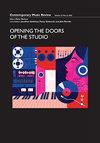ColecViva and its Collaborative Methods Viewed as an Educational Project
IF 0.1
2区 艺术学
0 MUSIC
引用次数: 2
Abstract
ABSTRACT The ColecViva was a group founded in 1985 by the composer Constança Capdeville (1937–1992) with the purpose of performing her own music theatre works. She composed, led, and acted as a performer in her own creations. Capdeville’s music theatre incorporates various artistic expressions such as dance, theatre, and cinema, resorting to different elements such as music, recorded sounds on tape, light, image, text, and movement, all structured as heterogeneous counterpoints. ColecViva’s activity also included seminars with discussions on aspects of performance and the group members shared their experiences with participants as an educational project. Although its activity has now ceased, ColecViva remains the only music theatre group to have existed in Portugal, with a lasting impact on those who were part of the group. It was also unique in the context of contemporary Portuguese music, as it sought to interpret a less widespread repertoire within a classical production style, revealing a connection with avant-garde aesthetics. This article aims to discuss ColecViva’s collaborative methods through an exploration of its educational activities, which influenced successive generations of performers who are now significant composers, performers (musicians, dancers, and actors), choreographers, directors, and musicologists.ColecViva及其协作方法被视为一个教育项目
本文章由计算机程序翻译,如有差异,请以英文原文为准。
求助全文
约1分钟内获得全文
求助全文
来源期刊

Contemporary Music Review
MUSIC-
CiteScore
1.00
自引率
25.00%
发文量
48
期刊介绍:
Contemporary Music Review provides a forum for musicians and musicologists to discuss recent musical currents in both breadth and depth. The main concern of the journal is the critical study of music today in all its aspects—its techniques of performance and composition, texts and contexts, aesthetics, technologies, and relationships with other disciplines and currents of thought. The journal may also serve as a vehicle to communicate documentary materials, interviews, and other items of interest to contemporary music scholars. All articles are subjected to rigorous peer review before publication. Proposals for themed issues are welcomed.
 求助内容:
求助内容: 应助结果提醒方式:
应助结果提醒方式:


